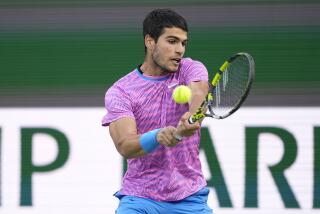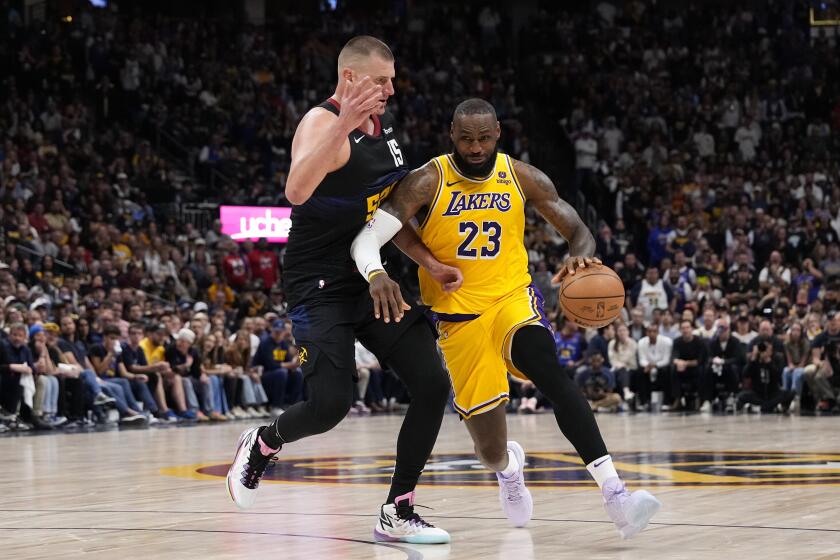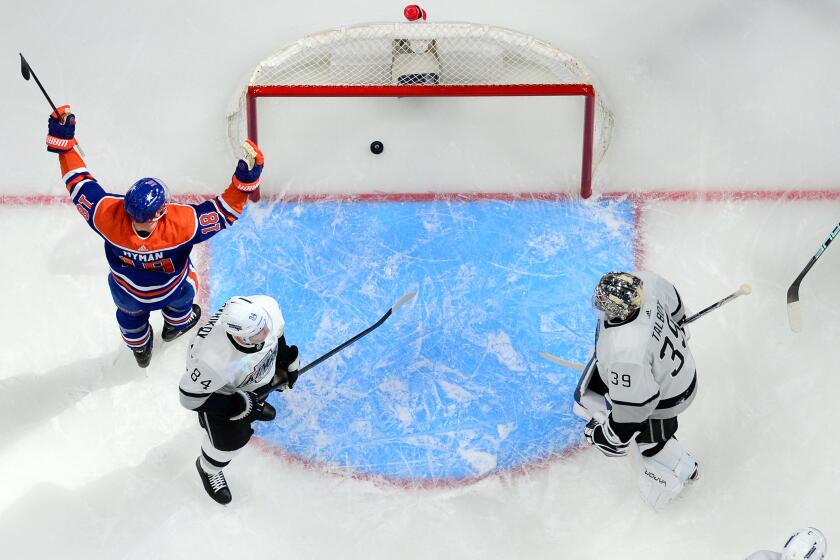Andy Murray flies under the radar but he’s still at top of his game
Andy Murray still doesn’t pack ‘em in, even on a sultry desert-perfect night in a big-time tennis event. Not even when he has taken his game to a level projected by many to be unreachable by the always-solid Scot.
In Murray’s case, the perception hasn’t quite caught up to the reality. In the minds of most, he remains No. 4, the player who is a notch below Novak Djokovic, Roger Federer and Rafael Nadal.
Tuesday night’s offering, at the BNP Paribas Open at the Indian Wells Tennis Garden was merely a round-of-16 match. Murray’s opponent was Yen-Hsun Lu of Taiwan. Only those who spend time at tennis clubs or know the difference between nylon and cat gut know Lu.
They announced 14,566 tickets sold for Tuesday night, but the 16,100 main stadium was about one-third full. Had it been Djokovic, Nadal or Federer, they would have jammed the stadium entrances.
Most sports fans know Murray. They just haven’t quite caught up with how good he has gotten. His Olympic victory last summer, followed by his first major title at the U.S. Open, hasn’t quite found traction yet.
Nor has the fact that his level of play has stayed high. He entered Indian Wells with one tournament victory, an 11-1 record this year and his only loss to No. 1 Djokovic in the Australian final. When Murray advanced Tuesday night, 6-3, 6-2, it looked routine, another predictable result on a tour that, by design, produces many of them.
But there was more going on. That will continue with Murray.
By beating Lu, a journeyman ranked No. 79, he settled a score that obviously had been eating at him, because it was the first thing he brought up in his post-match interview. He recalled it had been Lu who beat him in the first round of the Beijing Olympics.
That was their only meeting, but he also knew Lu was dangerous enough to have taken out Andy Roddick at Wimbledon three years ago. That was the day Lu entertained the media with stories of his father being a chicken salesman, working for him, and disliking it because the chicken farm “always smelled bad.”
Lu said, “So I catch the chicken. I can show you. Yeah, serious. I can catch a chicken.”
He said his best chance was at night, when the chickens couldn’t see as well. But that left little doubt that anybody playing Lu was taking on someone with pretty quick feet and hands.
For Murray, there were other matters to settle besides dispatching Lu. He had lost in his first matches at Indian Wells each of the last two years, and another this year could plunge him into a psychological hole.
That happened at Indian Wells to the fabled Goran Ivanisevic, a player good enough to win Wimbledon. Ivanisevic usually lost at Indian Wells early, always was remorse and confused about it and eventually rationalized, in his own screwball way, that all the old people eating dinner at night left him fearful they would die face-down in their soup. That put him off his game, he said.
Murray exists nowhere in that sort of twilight zone. But three straight years of early flops at Indian Wells would not have been good for the mind.
So, having taken care of an Olympic nightmare past, and erasing Indian Wells as a tennis black hole, Murray marches toward greater significance. If he wins the title, he will become No. 2, behind Djokovic and in front of Federer. No. 2 means better seeding at the Grand Slams, especially avoiding Djokovic until the end.
“Your draw improves dramatically,” Murray said, “You are still facing the same guys eventually, just in different combinations.”
Unspoken, but certainly understood, is that any seeding advantage at Wimbledon is key because Wimbledon will always be Murray’s Valhalla. He has no choice. He is British. There is no escaping the hopes and dreams of an empire of people who have waited since Fred Perry in 1936.
Winning an Olympic gold on the Wimbledon grounds was ice cream. Winning Wimbledon would add the hot fudge. Murray demonstrates every time out that he is good enough. The Brits know it. The rest of us just haven’t been paying close attention.
A 76-year pipe dream is now a realistic hope.
More to Read
Get our high school sports newsletter
Prep Rally is devoted to the SoCal high school sports experience, bringing you scores, stories and a behind-the-scenes look at what makes prep sports so popular.
You may occasionally receive promotional content from the Los Angeles Times.







